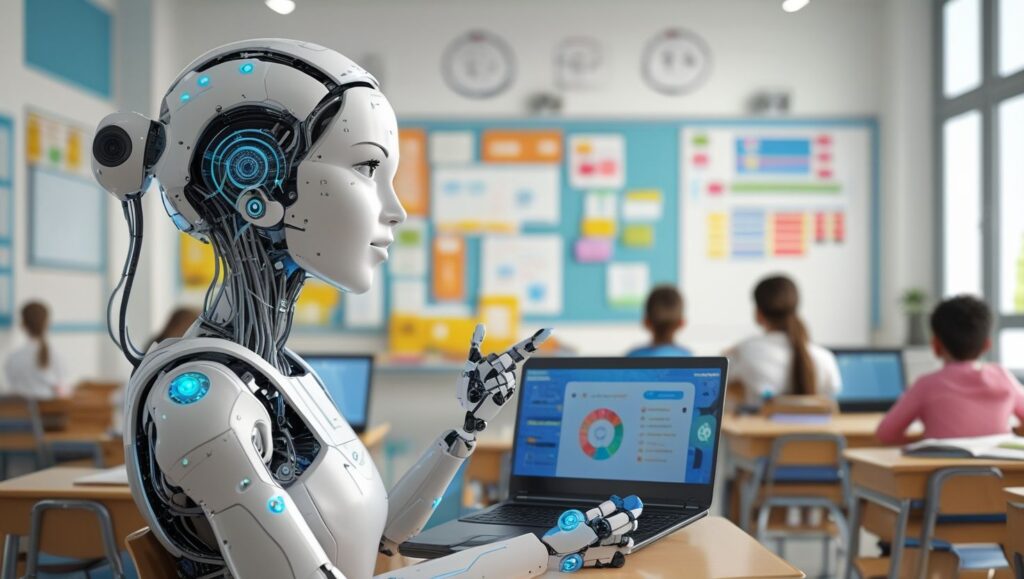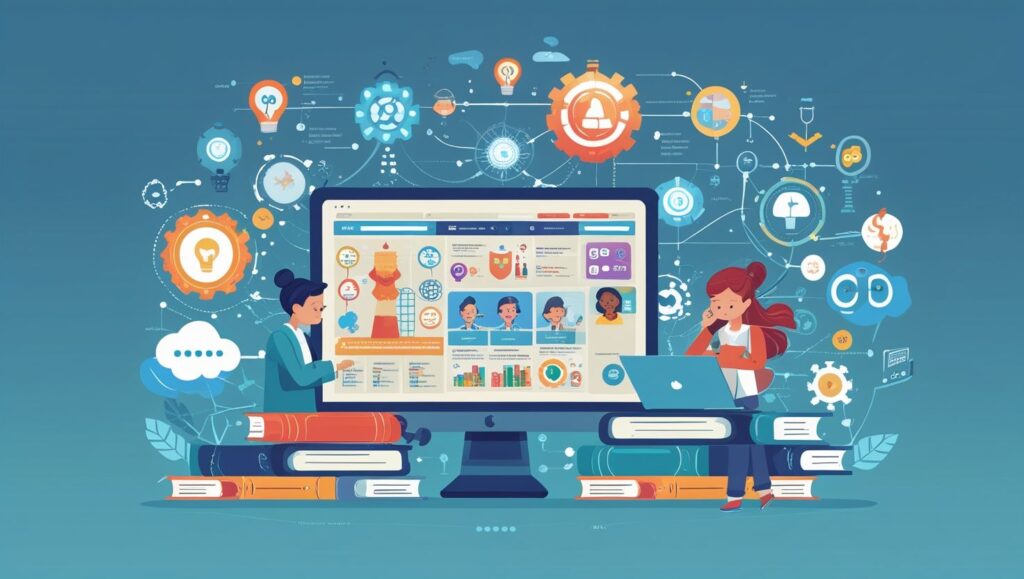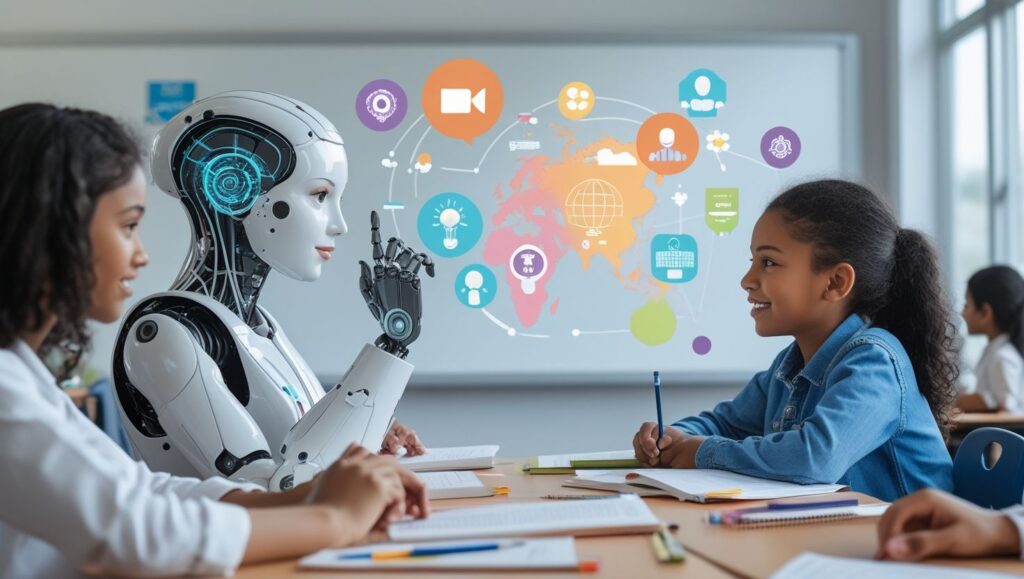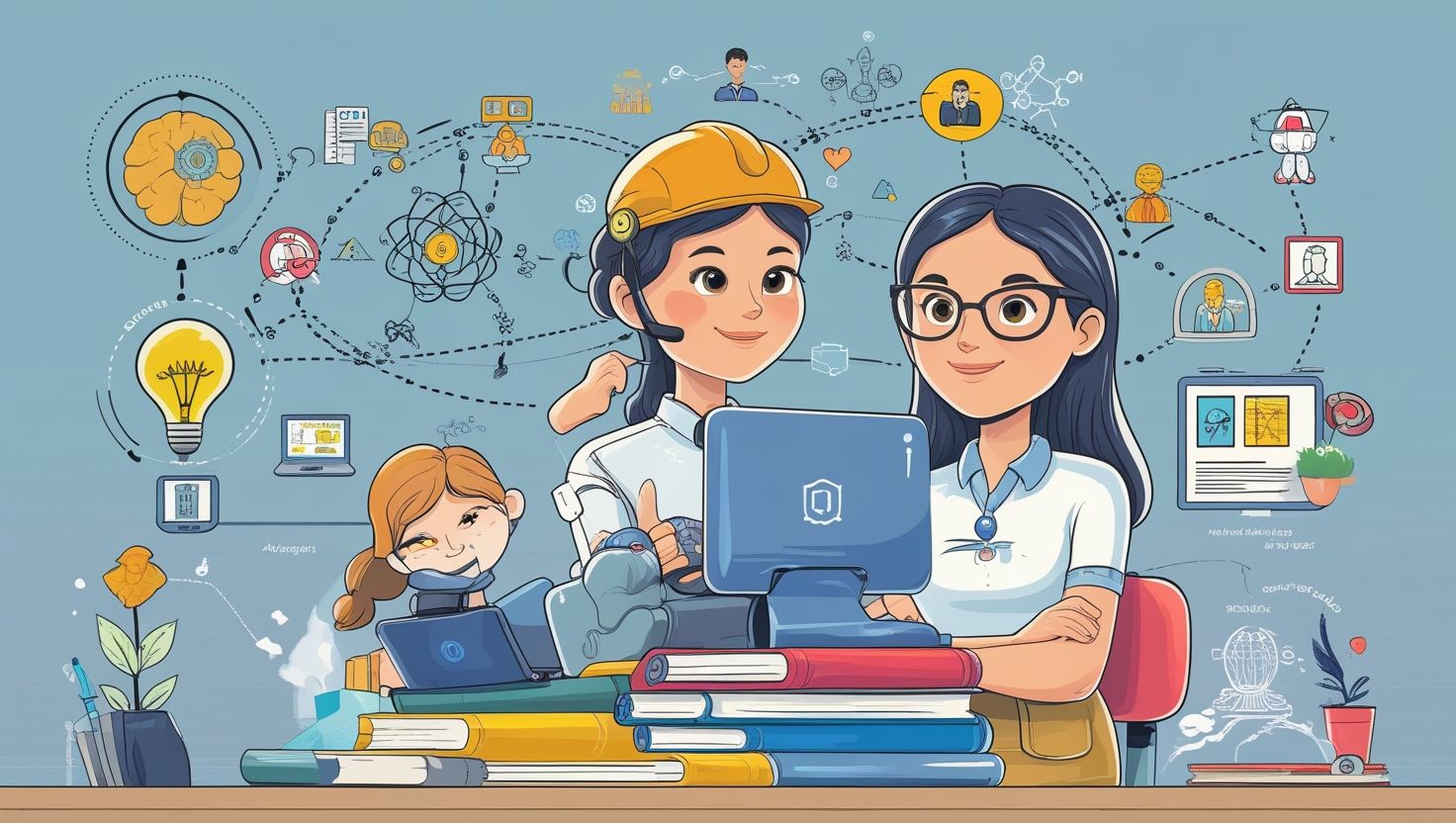Introduction
Artificial Intelligence (AI) and EdTech, Artificial Intelligence (AI) and Educational Technology (EdTech) are reshaping how students learn and how teachers deliver knowledge. AI-driven tools are no longer limited to futuristic visions; they are now present in classrooms worldwide. From personalized learning systems to automated grading, AI offers countless possibilities. Similarly, EdTech provides digital platforms, smart devices, and cloud-based resources that make education accessible and engaging.
Together, AI and EdTech create a dynamic learning environment where knowledge is interactive, adaptive, and inclusive. They help in addressing challenges such as large class sizes, limited teaching resources, and diverse learning styles. Moreover, with continuous advancements in technology, their impact on education is expanding rapidly. This combination not only enhances learning outcomes but also empowers teachers and students to focus on creativity, problem-solving, and innovation.
The Evolution of Educational Technology
EdTech has evolved significantly over the last few decades. Initially, it was limited to projectors, calculators, and computers. Over time, it developed into smart boards, e-learning platforms, and mobile applications. Today, EdTech integrates with AI to make learning personalized and adaptive. This evolution has been fueled by the rapid growth of the internet and digital devices. Students now access lessons through online portals, video lectures, and gamified learning apps. Teachers also benefit from digital tools that simplify lesson planning, assessment, and classroom management.
Importantly, EdTech has broken barriers of geography, making education accessible to learners globally. Online platforms like MOOCs (Massive Open Online Courses) allow students to acquire skills beyond traditional classrooms. Thus, the journey of EdTech reflects how technology continuously adapts to meet modern educational needs. This transformation is ongoing and will continue shaping future learning experiences.

Artificial Intelligence in Education
AI is revolutionizing the education system by introducing smart solutions. It allows for personalized instruction, intelligent tutoring systems, and predictive analytics. For example, AI-powered platforms analyze student performance and recommend tailored learning paths. Additionally, virtual assistants powered by AI can answer student questions instantly, reducing reliance on teacher availability. Grading systems have also become more efficient through automation, which frees educators to focus on teaching rather than repetitive tasks.
Moreover, AI helps institutions analyze vast amounts of data to identify trends and improve strategies. With adaptive testing, AI ensures that learners face questions suited to their skill levels, enhancing engagement and accuracy. Beyond classrooms, AI supports lifelong learning by offering on-demand resources and simulations. This makes education flexible and student-centered. Therefore, AI is more than a tool; it is a partner in reimagining how teaching and learning occur.
The Role of AI in Personalized Learning
Personalized learning is one of the most significant contributions of AI in education. Every student has unique learning needs, and AI-driven systems address them effectively. For instance, adaptive learning platforms adjust content difficulty based on student performance. If a learner struggles, the system provides additional resources. Conversely, advanced students receive challenging tasks to enhance their skills. This individualized approach ensures that no student is left behind.
Moreover, AI tracks progress in real time, offering teachers insights into strengths and weaknesses. Parents also benefit from detailed reports generated by AI systems. Personalized learning motivates students because it matches their pace and style. It reduces frustration, boosts confidence, and improves retention. Additionally, AI promotes inclusivity by supporting learners with disabilities through specialized tools. Thus, personalized learning powered by AI makes education more equitable, effective, and learner-friendly.

EdTech and Student Engagement
EdTech plays a vital role in increasing student engagement. Traditional teaching methods often struggle to capture attention, but digital tools make learning more interactive. For example, gamification introduces competition, rewards, and challenges, which motivate learners. Similarly, virtual reality (VR) and augmented reality (AR) bring abstract concepts to life, allowing students to explore subjects in immersive ways. Video lessons and collaborative platforms encourage active participation. Moreover, EdTech supports flipped classrooms where students learn content at home and engage in problem-solving during class. This approach encourages critical thinking and teamwork.
Teachers also use apps to track engagement and adjust strategies accordingly. Importantly, EdTech creates opportunities for experiential learning, where students learn by doing rather than memorizing. As a result, lessons become exciting, relevant, and memorable. Student engagement increases when learning feels meaningful and fun, which leads to improved academic performance.
Benefits of AI and EdTech for Teachers
Teachers greatly benefit from the integration of AI and EdTech. These tools reduce workload by automating routine tasks such as grading and attendance. Teachers also receive insights into student progress through data-driven reports, enabling them to tailor instruction. Moreover, lesson planning becomes easier with access to digital resources and templates. EdTech platforms allow teachers to share content, track assignments, and communicate efficiently with students.
AI-driven assistants support teachers by answering common student queries, saving time. Additionally, professional development opportunities are available online, enabling teachers to upgrade their skills anytime. Teachers also gain flexibility in designing innovative lessons using VR, AR, and multimedia. Furthermore, AI ensures inclusive teaching by offering solutions for diverse learning needs, including language translation and speech recognition. Overall, AI and EdTech empower teachers to focus on creativity, mentorship, and student engagement, which enhances their effectiveness and satisfaction.
Challenges of Implementing AI and EdTech
Despite their potential, AI and EdTech face challenges in education. One major issue is the digital divide, where not all students have access to devices or the internet. This creates inequality in learning opportunities. Additionally, schools often struggle with high implementation costs and lack of infrastructure. Teachers may also resist change due to limited training or fear of technology replacing their roles. Another concern is data privacy, as AI systems collect and analyze sensitive student information. Cybersecurity threats further complicate this issue. Moreover, overreliance on technology can reduce human interaction, which is essential for emotional and social learning.
AI algorithms may also show bias if not designed properly, leading to unfair outcomes. Therefore, while AI and EdTech offer great promise, their integration requires careful planning, investment, and ethical considerations. Addressing these challenges ensures sustainable and inclusive adoption.

The Future of AI and EdTech in Education
The future of education lies in stronger integration of AI and EdTech. As technology advances, learning will become even more personalized and interactive. For example, intelligent tutoring systems will simulate one-on-one teaching experiences. Virtual reality classrooms may replace physical boundaries, enabling global collaboration. AI will also enhance predictive analytics, allowing institutions to forecast trends and prepare accordingly. Furthermore, blockchain technology might ensure secure record-keeping for student achievements.
Teachers will increasingly rely on AI-driven tools for decision-making and support. Importantly, hybrid learning models that combine traditional teaching with digital tools will dominate. This ensures flexibility and inclusivity for diverse learners. Additionally, continuous innovations will reduce costs and improve accessibility. However, ethical frameworks and policies will be essential to safeguard privacy and fairness. Overall, the future promises a more efficient, engaging, and equitable educational system powered by AI and EdTech.
Conclusion
Artificial Intelligence (AI) and EdTech are transforming education at an unprecedented pace. Together, they create opportunities for personalized learning, improved student engagement, and enhanced teaching practices. Despite challenges such as cost, accessibility, and data privacy, their benefits are undeniable. AI provides intelligent solutions that adapt to student needs, while EdTech offers engaging platforms that make learning enjoyable. Teachers also benefit from reduced workloads and improved resources.
Importantly, Artificial Intelligence (AI) and EdTech, these tools prepare students for a digital future by fostering creativity and problem-solving skills. The integration of AI and EdTech is not about replacing teachers but empowering them to focus on meaningful interactions. With proper planning, investment, and ethical considerations, the future of education will be more inclusive and innovative. Ultimately, AI and EdTech pave the way for a smarter, learner-centered world where education is accessible to all.
References
- Holmes, W., Bialik, M., & Fadel, C. (2019). Artificial Intelligence in Education: Promises and Implications for Teaching and Learning. Boston: Center for Curriculum Redesign.
- Luckin, R. (2018). Machine Learning and Human Intelligence: The Future of Education for the 21st Century. UCL Institute of Education Press.
- Selwyn, N. (2021). Education and Technology: Key Issues and Debates. Bloomsbury Publishing.
- Chen, L., Chen, P., & Lin, Z. (2020). Artificial Intelligence in Education: A Review. IEEE Access, 8, 75264–75278.

20h8i9